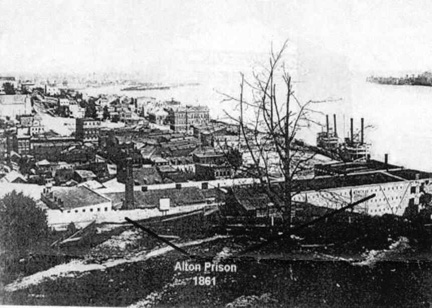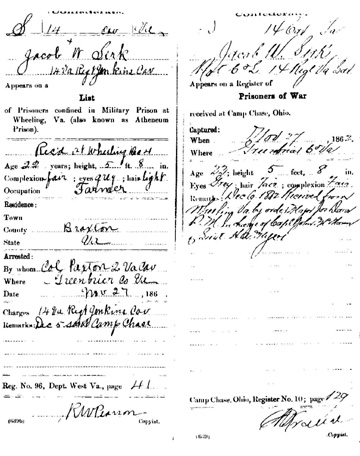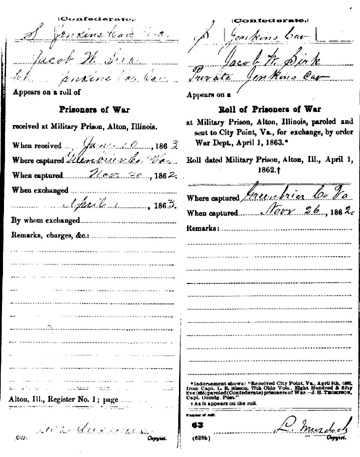During the summer and fall of 1862 the Union forces had been making raids throughout the
upper West Fork river basin and the Kanawha water shed. This area included what is now known
as Braxton County, West Virginia. Many of the farmers had been robbed of their livestock by
Federal troops with nopromise of payment or compensation of any kind, so when Confederate
recruiters came looking for recruits for the cause of the south many volunteered.
Among these recruits were three young men, Jacob Sirk, John Sirk, and Jehu Cunningham.
They all enlisted for the duration of the war and were sent to a camp just east of Lewisburg,
West Virginia near Cold Knob. Five companies made up of mostly new recruits were being
organized into the 14th Regiment, Virginia Cavalry. These companies were Braxton Dragoons,
Churchville Cavalry, Nighthawk Rangers, Rockbridge Cavalry, and the Valley Cavalry.
These companies combined contained nearly 500 men and were under the command of Lieutenant
Colonel John A. Gibson.
The campaign of 1862 had come to an end, so it was thought, and both forces
(North and South) had settled down to a holding operation in strategically placed winter
headquarters. Brigadier General George Crook, commanding the Union troops in the Kanawha
Valley, had established his headquarters at Camp Piatt, now Belle, on the Kanawha River,
a few miles east of Charleston. Farther to the east Greenbrier County was held by the
Confederates. Brigadier General Albert G. Jenkins, with a cavalry brigade had his
headquarters at Lewisburg, with outpost set up at various places to guard against a surprise
by Union troops. Two of these outposts, manned by independent companies of Virginia
partisan rangers, being organized into the 14th Virginia Cavalry, CSA, were located in the
Sinking Creek Valley, twelve or fifteen miles east of Lewisburg.
The company in which Jehu, John, and Jacob and others from Braxton County had enlisted
was located at Lewis Mill in the upper valley some two or three miles from the foot of
Cold Knob Mountain. These five companies of rangers were stationed at that place to be
reorganized and equipped.
General Crook (USA) was determined to send an expedition to break up these camps and,
if successful, to have a cavalry force push on through the mountains to Covington, Virginia.
The Union troops selected for the expedition were the 2nd Virginia Cavalry, commanded by
Colonel John C. Paxton and the 11th Ohio Infantry, under Colonel Philander P. Lane.
Early in the morning of 25 November it started raining and as the day continued the
temperature fell well below freezing and the rain turned to snow. It was all the troops
could do to just keep warm and dry through the night into the next day of the 26th.
By midmorning the snow had piled up to well over a foot deep.
The Union forces located at Summersville, West Virginia had left there encampment on
the 24th to move into Virginia by way of Cold Knob. The Union troops were suffering as much
as the Confederates from the cold and snow, but still made their way to the vicinity of
Cold Knob near the encampment of the Confederates.
Major Powell with about twenty men of Company "G" moved out in advance of the regiment
and suddenly came upon and attacked the Confederate encampment about noon of the 26th.
Due to the cold and snow the Confederates were very poorly organized and the small group of
Union troops met very little resistance. The Confederates were routed but most of them
escaped to later organize into the 14th Virginia Cavalry, CSA. The only casualties for the
Union was the loss of two horses.
As a result of the raid the Confederates losses were: two killed, two wounded and one
paroled. Two officers and 111 enlisted men were captured, 106 horses, 5 mules, and the
destruction of 200 rifles. All other supplies that could not be carried off were burned or
destroyed.
John Sirk and Jehu Cunningham escaped and rejoined other Confederate forces but
Jacob Sirk was taken prisoner.
Pvt. John Sirk, after escaping the attack joined Company "L" of the 14th Regiment, Virginia
Cavalry. Soon after, he was transferred to Company "I" 17th Regiment, Virginia
Cavalry. He served in Company "I" until the winter of 1863.
In November of 1863 he was listed as a deserter. the whereabouts of John were not known until
December 18, 1864 when he appeared in front of the Provost Marshal of the
Union Headquarters, Kanawha Valley Forces, Dept. of West Virginia and was required to sign an
oath of allegiance and loyalty to the Constitution and Government of the United States of
America.
Oath required to be signed by a Confederate Soldier before being released by the Union Army

Jacob Wesley Sirk was listed as being arrested on November 27th and was sent to Atheneum
Prison Wheeling, Virginia, where he was received on December 4, 1862 and was described in records as being; age 22, height 5 ft. 8 in.,
complexion fair, eyes grey and hair light. He was transferred immediately and was received at Camp Chase, Ohio on the next day. He
was later transferred to the US Federal Military Prison, Alton, Illinois.

Jacob Later appeared on a "Roll of Prisoners of War", paroled by order of the War Department dated April 1, 1863. The record was
endorsed as "Received City Point, Virginia on April 8th 1863. There were 855 POWs in this group and they were released over the next
year. Jacob was made to sign the "Oath of Allegiance", and was released late in 1864 and returned to his home in Braxton County,
West Virginia.


Return to Sirk Family Page
Return to Biography Page
MAIN PAGE

